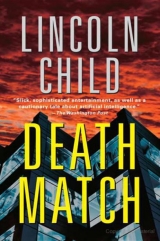
Текст книги "Death Match"
Автор книги: Lincoln Child
Соавторы: Lincoln Child
Жанр:
Триллеры
сообщить о нарушении
Текущая страница: 18 (всего у книги 26 страниц)
FORTY-TWO
Richard Silver stepped carefully from the treadmill and paused, breathing hard, while the belt finished decelerating. Turning off the machine, he reached for a towel and mopped his brow. It had been one of his toughest workouts – forty-five minutes at six miles per hour, eight-percent grade – yet his mind remained as troubled as when he first got on.
Dropping the towel into a canvas bin, he left the exercise room and walked down the corridor to the kitchen, where he filled a glass of water from the tap. Nothing he did seemed to remove the oppressiveness that hung over him. It had been this way since the morning, when the sheet naming Lash as the only possible killer emerged from the printer.
He took a few disinterested sips, placed the glass in the sink. He stood a moment, staring without really seeing. And then he sank forward, leaning his elbows on the counter and pressing a fist against his forehead: once, twice, a third time…
He had to stop. He had to get on with things, he hadto. Maintaining a semblance of normality was the only way to get through this least normal of times.
He straightened. Four-fifteen. What would he normally be doing now?
Having his afternoon session with Liza.
Silver exited the kitchen and headed for the end of the corridor. Usually his mornings were devoted to reading tech journals and white papers; his early afternoons to business matters; and his evenings to programming. But he always made time to visit with Liza before dinner. This was when he spoke with her, discussed program updates, got a sense of her progress. It was a time he always looked forward to: communicating with something that was part himself, part his invention, was a feeling unlike any other Silver had ever known. It was worth all the effort it cost him. It was an experience he could never hope to communicate to anybody else.
He guarded this time against all interruptions, always began promptly at four. Today was the first time he’d been late since Liza and her vast array of supporting hardware were installed in the penthouse, four years earlier.
Slipping into the contoured chair, he began fixing the electrodes, struggling to clear his mind. Only long practice made it possible. Minutes passed while he prepared himself. Then he placed his hand on the keypad and began to type.
“Richard,” came the haunting, disembodied voice.
“Hello, Liza.”
“You are seventeen minutes late. Is anything wrong?”
“Nothing is wrong, Liza.”
“I am pleased. Shall I begin with the status report? I have been testing the new communications pseudocode you installed and have made some minor modifications.”
“Very good, Liza.”
“Would you like to hear the process details?”
“No, thank you. We can skip the rest of the report today.”
“Then would you like to discuss the latest scenarios you assigned? I am preparing to undertake scenario 311, Creating False Positives in the Turing Test.”
“Perhaps tomorrow, Liza. I feel like proceeding directly to the story.”
“Very well.”
Silver reached beneath the chair – careful not to loosen any of the electrodes as he did so – and pulled out a well-thumbed book. It was his mother’s, one of the very few he’d retained from earliest childhood.
The high point of his sessions with Liza was always the reading. Over the years he had progressed from the very simplest stories, teaching her, by example, the rudiments of human values. It was satisfying in an almost paternal way. It always made him feel better, less lonely. Perhaps today it could clear even the dark cloud of guilt that hung over him. And perhaps by the time he’d finished reading, he would have the courage to voice the question he both yearned – and dreaded – to ask.
He paused to refocus his mind, then opened the book. “Do you recall where we left off, Liza?”
“Yes. The rodent Templeton had retrieved the egg sac of the spider.”
“Good. And why did he do it?”
“The pig had promised sustenance in return.”
“And why did the pig’s friend, Charlotte, want the egg sac saved?”
“To ensure the survival of her children and thus the propagation of the species.”
“But Charlotte could not save the egg sac herself.”
“That is correct.”
“So who saved it?”
“Templeton.”
“Let me rephrase. Who was the motivic agent in saving the egg sac?”
“The pig Wilbur.”
“Correct. Why did he save it, Liza?”
“To achieve parity with the spider. The spider had assisted him.”
Silver lowered the book. Liza had no trouble understanding motives like self-survival and behavior rewards. But even now, the other, subtler, emotions remained hard to grasp.
“Are your ethical routines enabled?” he asked.
“Yes, Richard.”
“Then let us go on. That is one reason he saved the egg sac. The other is the feelings he had for the spider.”
“You speak metaphorically.”
“Correct. It is a metaphor for human behavior. For human love.”
“Yes.”
“Wilbur loved Charlotte. Just as Charlotte loved Wilbur.”
“I understand, Richard.”
Silver closed his eyes for a moment. Today, even this most prized of times felt hollow. The question would have to wait.
“I must terminate this session, Liza,” he said.
“Our dialogue has only lasted five minutes and twenty seconds.”
“I know. There are a few things I need to do. So let us close by finishing chapter twenty-one.”
“Very well, Richard. Thank you for speaking with me.”
“Thank you, Liza.” And Silver raised Charlotte’s Web, found the dog-earned page, and began:
Next day, as the Ferris wheel was being taken apart and the race horses were being loaded into vans, Charlotte died. Nobody, of the hundreds of people that had visited the Fair, knew that a grey spider had played the most important part of all. No one was with her when she died…
FORTY-THREE
This time, it was Lash who found himself in the conference room, sitting alone on one side of the table. It was Lash who stared into the lens of the video camera, into the grim faces across from him. Edwin Mauchly sat at the center. But today, Tara Stapleton was not at his left. Dr. Alicto was there instead, wearing a green surgical smock. As his eyes caught Lash’s, he nodded, smiling pleasantly.
Mauchly glanced at some papers that lay before him. Then he looked across the table.
“Dr. Lash. This is very difficult for all of us. For me personally.” Normally so impassive, Mauchly looked ashen-faced. “I, of course, take responsibility for the whole thing.”
Lash was still a little dazed. I take responsibility. So he knew this was a mistake, some bizarre mix-up. Mauchly would apologize, and they could all get back to work. Hecould get back to work…
But then, where was Tara?
Once more, Mauchly glanced down at the desk, rearranging the papers. “To think we took you in. Asked for your help. Gave you access to our most privileged data. Ignorant of the truth the whole time.”
More briskly, he snapped on the tape recorder, nodded to the cameraman.
“Dr. Lash, do you know why you’re here?” he asked. “Why we’re talking to you?”
Lash froze. These were the words with which Mauchly had begun Handerling’s interrogation.
“You were brazen,” Mauchly went on after a moment. “Walking, in effect, into the teeth of the enemy.” He paused. “But I suppose you had no choice. You realized we’d find you eventually. This way, you at least had a chance to save yourself. You could muddy pools, deflect attention, waste time making us to look in all the wrong places. Under other circumstances, I might be impressed.”
Numbness, which had begun to recede, spread again throughout Lash’s limbs.
“Silence won’t help. You know how thoroughly we work, you’ve seen it firsthand. Over the last several hours we’ve assembled all the evidence we need: the credit card statements, telephone logs, video surveillance feeds. We have you at the locations of the deaths at the right times. We have your past history, your criminal record. The realreason you were forcedto leave the FBI.”
Lash’s disbelief deepened. Telephone logs, surveillance feeds? A criminal record? He had no record. And he hadn’t been asked to leave the FBI. It was crazy, it made no sense…
But then he realized it didmake sense. It made perfect sense. The real killer knew Lash was closing in. Only the real killer had the power to create such evidence, produce this tissue of lies.
“We would have caught you earlier, of course. But your special status – you weren’t actually a client, and you weren’t actually an employee – kept you from consideration before. Frankly, I’m surprised you didn’t make a break for it when you learned we were widening our search.”
Mauchly was employing another interrogation technique. He was re-creating – for Lash, and for the other listeners in the room – Lash’s own movements and deeds, the motivations leading up to the crime.
“But of course, you didmake a break for it. Today. You left for several hours, just before we were due to complete the suspect search. And when you came back you refused to enter the building. Why was that?”
Lash said nothing.
“Did you have some, shall we say, unfinished business with Tara Stapleton, who you felt knew too much? Or now that we were closing in, did you feel the need to erase your old records was worth the risk?”
Lash worked to conceal his surprise. What old records?
“Last Friday you were caught by security, trying to go outside the Wall with several folders inside your satchel. What was in those folders, Dr. Lash?”
The room was silent for a moment.
“It was my mistake not to examine them at the time, and again, I take full responsibility. But we’ve now cross-checked the online security logs. Let me remind you, for the record, just what was in those folders. Copies of your own original Eden candidate application, filled out eighteen months ago.”
Again, Lash struggled to conceal his surprise. I was never a candidate. Not really. I never filled out any application! I was never even in the building until two weeks ago!
“Despite the pseudonym and the false information, there’s no doubt the applicant was you. And the psychological profile we put together at that time – compared to the one Dr. Alicto completed on you just recently – is revealing. Very revealing indeed.”
Mauchly leaned back in his chair. The troubled look, the hesitation, was gone. “I can imagine how the irony of our approaching you for help– you, of all people – must have struck home. Certainly it exposed you to great risk. But also to great reward. Not only did it make it easier to gain access to future victims, but it allowed you to go through the evaluation process again. Given your position, you could make such a request without arousing suspicion. And this time, knowing in advancewhat to expect, you were more successful.”
Mauchly looked at him, eyes narrowing. “Needless to say, steps have been taken to place Diana Mirren out of harm’s way. You won’t be hearing from her again, and she certainly won’t be hearing from you.”
Lash just managed to remain silent.
“And the Connellys can now enjoy their trip to Niagara Falls without fear of your descending on them like an avenging angel.”
When Lash still did not respond, Mauchly sighed. “Dr. Lash, you of all people should know what’s in store for you. Once we’ve completed the interrogation process, you’ll be handed over to federal authorities. You have a chance to help yourself now.”
The room fell into a deep, listening silence. At last, Dr. Alicto spoke up.
“You’re not likely to get anything useful from him,” he said. “At least, not voluntarily. Chances are his psychosis is too advanced.”
Mauchly nodded, disappointment on his face. “Your recommendation?”
“Thorazine, followed by a sufficient dose of sodium amytal, may render him temporarily chatty. Or at least remove any conscious ability to dissemble. We can prep him in one of the medical suites.”
Mauchly nodded again, more slowly. “Very well. But let’s not take any chances.” He turned, spoke to someone standing behind Lash. “You and your men accompany Dr. Alicto to Medical. Once there, I want Lash confined to a gurney with leather restraints.”
“Understood,” came a familiar-sounding voice.
Mauchly turned back to Alicto. “How long until he’s ready?”
“Sixty minutes. Ninety, to be safe.”
“Proceed.” Mauchly stood up, looked at Lash cooly. “I’ll see you again shortly, Dr. Lash. Meanwhile, you leave me the unenviable task of breaking all this to Richard Silver.”
He held Lash’s gaze for a moment. Then he turned on his heel and left the conference room by a rear door.
A heavy hand fell on Lash’s shoulder. “Come with us,” said the familiar voice.
As the hand raised him from the seat and swivelled him around, Lash looked into the green eyes of Sheldrake, the security honcho. Sheldrake stepped to one side, motioning Lash forward. As he walked, Lash registered half a dozen security guards falling into position behind him.
The door in front of him opened. As in a dark dream, Lash stepped into the hallway, a guard at each elbow. They guided him down one corridor, then another, on their way to Medical.
Ahead, where two hallways intersected, Lash saw a small knot of people. A technician was approaching them from the intersection, wheeling some piece of equipment on a metal cart.
Lash’s sense of unreality grew stronger. As they approached the intersection, one of the security officers took his elbow. “Make a left up ahead, and stop at the elevator bank,” he murmured. “Don’t be difficult if you know what’s good for you.” The technician with the cart was almost upon them, and the guards guided Lash to one side so the man could pass.
At that moment, Lash felt a strange thing happen. Time seemed to slow. The steps of the surrounding guards decelerated until each footfall became distinct. He could hear his heart beating monotonously, like a drum.
He turned suddenly, tugging free of the guard’s hand. Behind he could see the other four guards, Sheldrake and Dr. Alicto bringing up the rear. Sheldrake’s eyes met his and something unspoken passed between them. Lash saw Sheldrake’s mouth begin to open and his arm rise, but everything was moving so slowly there was still plenty of time. Taking the cart from the technician, Lash flung it at the guards behind him. He felt the two at his sides trying to restrain him: he stomped the instep of the first and sent a knee into the groin of the other.
His limbs seemed to move under some foreign control, as if a puppeteer was guiding him. The cart had upended, entangling the rear guards; Lash grabbed the technician and shoved him into the advancing Sheldrake. The two fell backward in a tangle. And then Lash turned back toward the intersection and began to run. And as he did so – as he reached the crossing, glanced in both directions, chose a corridor, broke through the small knot of workers and dashed away – it seemed time once again began to speed up, faster and faster, until his thoughts, his breathing, and the churning of his legs became a blur of sound and color.
FORTY-FOUR
Lash turned a corner, dashed headlong down a new corridor, turned again. Then he stopped and pressed himself against the wall, looking around wildly. There was nobody in sight. In the distance he could hear raised voices, running feet. His heart – which just moments before had seemed to beat so slowly – was hammering with a machine-gun cadence. He waited another second, trying to slow it down. Then he pushed himself from the wall and continued. The sounds were not quite as distant now, and he ducked into yet another corridor, passing a door labeled ARRAY MAINTENANCE / SUBSYSTEM B. Apparently, he had moved into a hardware support area, manned by relatively few workers.
But it made no difference. It was only a matter of time until they ran him down and resumed the interrogation, with handcuffs and restraints and meds this time.
He struggled against overwhelming disbelief. How had this happened, and happened so quickly? Had he really risen from bed that morning a free man, only now to be hunted as a psychotic murderer? It seemed impossible that anybody, especially a man like Mauchly, could believe it. Yet it was all too clear that he, and everybody else, didbelieve. And Lash could imagine what the proof was. Mauchly had recited the list of phony but no doubt all too credible evidence: telephone bills, psychological evaluations, even a criminal record. How was it possible to fight someone with the almost infinite resources of Eden at their fingertips?
Somebody appeared in the hallway before him – a technician, dressed in a white lab coat – and Lash trotted past her, head down, without nodding. Another intersection, another quick turn. The hall was narrower here, the doorways farther apart.
Had it really begun as far back as those missing newspapers, the E-ZPass and ATM snafus, the tampering with his mail? Was it possible it had begun so early?
Yes. And then the credit card refusals, the problem with his mortgage payments. It had all been part of a campaign of increasing pressure. Pressure brought to bear because he was getting too close.
And now – now that he knew all – steps would be taken to make sure he would never be heard. He’d be locked away, and his cries would mingle with those of every other inmate protesting his innocence…
He stopped suddenly. Was he becoming paranoid in his extremity, or was it possible even the parole of Edmund Wyre was part of this elaborate attempt to silence him? And was it also possible the mistake that put his own rejected avatar in the Tank, that seemed to promise such a bright future, had simply been a method to keep closer tabs on…
He willed his feet forward once again. But as he did, Mauchly’s words echoed: Steps have been taken to place Diana Mirren out of harm’s way. You won’t be hearing from her again.
There hadto be somebody he could talk to, somebody who’d believe. But who inside the fortress of Eden knew anything about him, much less why he was really here? It had been a carefully guarded secret from the beginning.
He could, in fact, think of only one desperate chance.
But how? He was lost in an endless maze of corridors. Everything was monitored. His hand fell to the identity bracelet circling his wrist. A dozen scanners would no doubt have tracked his progress. It was only minutes, seconds, until he was found.
His eye fell on a door marked WEB FARM 15. He reached for the handle, found it locked. With a low curse, he moved his bracelet toward the identity scanner.
Then he paused. Stepping back quickly, he trotted down the hall, positioning his bracelet below the scanners of half a dozen other doors, in turn. Then he returned to the first door, positioned his bracelet. With a click, the door sprang open, and Lash stepped inside cautiously.
The room was dim. As he’d hoped, it was deserted. Twin banks of metal shelving rose from floor to ceiling, jammed with rack-mounted blade servers: a tiny fraction of the massive digital horsepower that made Eden possible. He walked between the shelves to the back of the room, scanning the walls and floor. At last he saw it: an oversize metal plate, set just above the floor molding. It was painted the same pale violet as the walls, but it was clearly visible.
He knelt before it. The plate was perhaps four feet high by three feet wide. For a minute, he feared it might be locked, or guarded by an identity scanner like the doors. But it was fastened with a simple hinge that yielded to his touch. He drew it open, looked inside.
Beyond, he could make out a cylindrical tube of smooth metal. The sides and ceiling were covered in a dense flow of cabling: fiber-optic, CAT-6, half a dozen other types Lash did not recognize. A cold cathode line ran along the ceiling, emitting faint blue illumination. Farther down the accessway, Lash could see the tube dividing, first once, then again, like the tributaries of a great river.
He smiled grimly. A river was a pretty good metaphor. This data conduit was a river of digital information, linking every place inside the Wall with every other. He remembered how Mauchly had gone on about the high levels of security, about the countless roadblocks preventing data from straying outside the Wall. And Lash knew – from firsthand experience – that the Wall was virtually impregnable. All the scanners, checkpoints, security apparatus, were fanatically devoted to preventing secrets from getting out. They would be just as efficient at preventing himfrom getting out.
But what if he wasn’t tryingto get out? What if, in fact, he wanted to stay insidethe Wall – penetrate deeper into its secret recesses?
Lash looked around the room one last time. Then, as quickly and carefully as he could, he crawled into the data conduit and shut the panel behind him.








